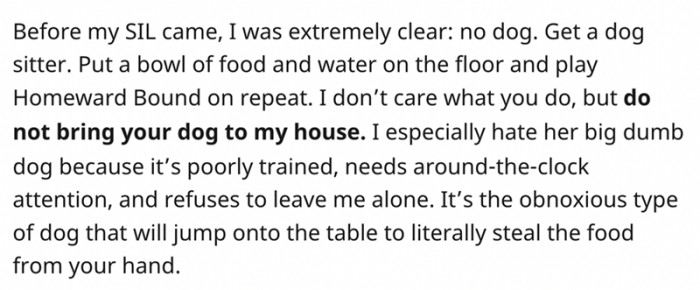Drama Starts As Man Makes His SIL Take Back Her "Poorly Behaved Service Dog" Who She Brought To A Family Event
Okay, let’s discuss the difference between having a service animal and an emotional support animal. It is important to note that emotional support animals are not the same as service animals, and the ADA only protects service animals.
Emotional support animals are absolutely legal and adorable, but it poses no danger if they are separated from their owners for some time. Service animals, on the other hand, perform fundamental life-saving tasks for their humans, and being separated from them is extremely dangerous.
The dog referred to by the OP in today’s story happens to be an emotional support dog and not a service dog. The Redditor named SILobnoxiousdog brought his story to the r/AITA subreddit community for them to decide if his actions were wrong.
Okay, the story goes like this—the OP and his wife live in "the largest house with the most bedrooms," and his wife’s family was visiting again. Now, it happens that the OP’s sister-in-law loves dogs, and she takes her dog everywhere.
On the other hand, the OP hates dogs and does not want them near him. Because of this, he personally told his SIL not to bring her dog to his house and that she should find a dog sitter instead.
But lo and behold, his SIL showed up at his house with the same dog. Keep scrolling to read what happens next!
Here, we have the headline...

The OP also mentioned that her "big dumb dog was poorly trained and needed around-the-clock attention." In any case, his SIL appeared with her dog, using the excuse that the dog sitter canceled, and the OP wasn’t having any of it.
Keep scrolling to read all that transpired below.
Practical Steps for Conflict Resolution
To mitigate potential conflicts arising from differing views on service and emotional support animals, families can adopt several practical strategies. First, establishing clear communication channels is vital. Family members should openly express their feelings about the presence of a service animal or ESA, discussing how it impacts them personally. This aligns with findings from the Journal of Family Issues, which emphasizes the importance of open dialogue in resolving family conflicts.
Additionally, setting boundaries in advance of family events can help preemptively address concerns. For instance, agreeing on specific areas where the animal can or cannot be present can help minimize discomfort. Lastly, engaging a neutral third party, such as a family therapist, can help facilitate these discussions, ensuring that all voices are heard and respected while guiding the family toward a harmonious resolution.
They'd take a couple of days off

My sister-in-law is a huge lover of dogs

Understanding Service Animals
The distinction between service animals and emotional support animals (ESAs) is crucial, especially in family dynamics. According to Dr. Gary Chapman, a renowned marriage counselor, "Understanding the roles of different types of support animals can help prevent misunderstandings that may lead to conflict." This classification has significant implications for both legal protections and social acceptance. Research indicates that misunderstandings surrounding these categories can lead to conflict in personal relationships, particularly when family members feel their boundaries are being disregarded. For instance, relationship expert Dr. Eli Finkel states, "When family members have differing views on the role of a pet, it can create tension and feelings of disrespect." Such misunderstandings can foster resentment and strain family bonds, making it essential for clear communication about expectations and boundaries regarding service animals.
Get a dog sitter because dogs aren't allowed

She had the audacity to play it off

The dog can stay in the car and she started debating it

A family gathering can amplify tensions when expectations clash, particularly concerning the presence of animals. As noted by Dr. Alexandra Solomon, a relationship therapist, "When family members have differing views on pets, it can create a rift that needs careful navigation." This is especially true in cases where one party feels a strong emotional connection to their animal, while another party views the animal as an unwelcome addition. In instances like this, it’s vital for all parties to engage in open discussions about their emotional needs and boundaries. Dr. Dan Siegel, a psychiatrist, emphasizes, "Understanding each other's perspectives is key to resolving conflicts." To navigate these complex situations, family members might benefit from employing conflict resolution strategies. Active listening and empathic communication can facilitate understanding, helping each party articulate their perspectives without dismissing the other's feelings.
My wife said they could stay just one night

They all called me a monster because I didn't agree with their decision

The Reddit thread garnered a lot of attention. Some Redditors were clear about how they hate people who lie about their dog’s duty, while others were of the opinion that a badly behaved dog is a no-no.
We’ve gathered some of their comments below, so go ahead and check them out.
The type of people I despise are people who lie...

Impact of Emotional Support Animals
The role of emotional support animals in providing comfort and companionship cannot be overstated. Research conducted by Dr. Allen McConnell at Miami University shows that pets can significantly reduce feelings of loneliness and anxiety, contributing positively to mental health outcomes. In his study, participants reported greater feelings of social support when they had access to pets, suggesting that these relationships can serve as a buffer against emotional distress.
However, the reliance on emotional support animals can also create complications, particularly in family contexts where others may not share this bond. As noted in a study published in Applied Animal Behaviour Science, misunderstandings about the role of ESAs can lead to familial conflicts. When family members feel uncomfortable or disrespected by the presence of an ESA, it can create a rift. Therefore, it’s important for those who rely on ESAs to communicate openly about their needs while also being receptive to the concerns of others.
She has a service dog

You said no to the dog issue the first time

A badly behaved dog on your vacation is the worst

Understanding the psychological principles behind attachment can provide insight into why individuals may feel strongly about their service or emotional support animals. Attachment theory suggests that early relationships shape how individuals bond with others, including animals. According to research from the American Psychological Association, people who have securely attached relationships often view their pets as extensions of their social networks.
This bond can be particularly profound for individuals who experience anxiety or trauma, as pets often provide unconditional love and support. However, it's crucial to recognize that not everyone shares the same attachment to animals, which can lead to misunderstandings in family dynamics. Therefore, a balanced approach that respects both the emotional needs of the pet owner and the comfort levels of others is essential.
It is truly despicable to lie about your dog's being a service animal rather than an ESA. The OP was within his rights to state the rules because it is his house, after all.
Or do you have a different opinion on this? What would you do if you found yourself in the OP's situation?
Do share your thoughts with us in the comments section.
Psychological Analysis
This situation highlights the clash of personal boundaries and emotional needs within family dynamics. The OP's strong aversion to dogs suggests a need for control over his environment, which can stem from past experiences or personal preferences, while the sister-in-law's attachment to her emotional support dog indicates her reliance on that bond for comfort. When one person's needs overshadow another's, it often leads to misunderstandings and conflict, emphasizing the importance of clear communication and mutual respect in family interactions.
Analysis generated by AI
Solutions & Coping Strategies
Family dynamics can be complex, especially when they intersect with emotional needs and the presence of animals. Understanding the psychological principles underlying attachment and emotional support can foster empathy and cooperation among family members. Research shows that open, respectful communication is essential in navigating these situations, allowing families to find common ground and honor each other's needs. Ultimately, healing and understanding in family relationships require not just acknowledgment of differing perspectives but a commitment to shared values of respect and love.



